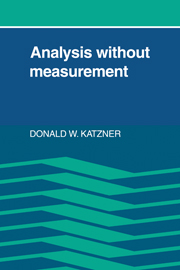Book contents
- Frontmatter
- Contents
- Preface
- Dedication
- 1 Introduction
- 2 Notes on measurement
- Part I Theoretical methods
- Part II Applications to theoretical problems
- Prologue
- 8 Political systems
- 9 Planning
- 10 Simultaneous change and modernization
- 11 Profits, optimality, and the social division of labor in the firm
- Part III Empirical verification
- Index
11 - Profits, optimality, and the social division of labor in the firm
Published online by Cambridge University Press: 04 August 2010
- Frontmatter
- Contents
- Preface
- Dedication
- 1 Introduction
- 2 Notes on measurement
- Part I Theoretical methods
- Part II Applications to theoretical problems
- Prologue
- 8 Political systems
- 9 Planning
- 10 Simultaneous change and modernization
- 11 Profits, optimality, and the social division of labor in the firm
- Part III Empirical verification
- Index
Summary
Neoclassical theory has traditionally taken the production function as an exogenous datum reflecting the technical structure of production (Samuelson, Ferguson). Hence little effort has been expended on the analysis of the production process itself. (Two notable exceptions, Coase and Simon, are discussed subsequently.) Yet surprisingly powerful theorems follow from this hypothesis according to the microeconomic logic of profit maximization. Certainly the most central of these theorems is that the profit-maximizing firm will choose Paretooptimal production under normal conditions.
But in general, there is no reason to suppose that profit-maximizing entrepreneurs will make profit-maximizing decisions that are also in the best interests of their workers. In any given circumstance, therefore, it may be possible to make workers better off without reducing profits. Such a situation cannot be Pareto optimal, and there is no obvious mechanism, such as competition, operating within the firm that automatically leads it to optimality. Indeed, by modeling the firm as a complex collection of social relationships, we shall suggest that the neoclassical assertions concerning optimality in the firm hold only under restrictive and highly unrealistic assumptions. Specifically, profit maximization need not always result in the optimal allocation of human resources.
This observation calls into question a number of derivative but socially critical propositions often expressed as follows. First, the structure of authoritarian relations in the firm will be Pareto optimal. Secondly, wage differentials will reflect differences in the marginal productivity of workers in specified jobs. Thirdly, worker sovereignty will obtain in the same sense, and under the same conditions, as the more traditional consumer sovereignty (Gintis).
- Type
- Chapter
- Information
- Analysis Without Measurement , pp. 205 - 230Publisher: Cambridge University PressPrint publication year: 1983



